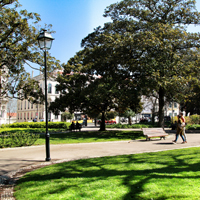Moving to Sagres, Portugal
Last updated on Oct 27, 2024
Summary: Moving to Sagres, Portugal? Expats talk about what you need to know before moving to Sagres.
What do I need to know before moving to Sagres?
When we asked people what advice they would give someone preparing to move to Sagres, they said:
"Sagres is a small town located in the Algarve region, known for its stunning beaches, surfing spots, and historical landmarks. The official language is Portuguese, so learning some basic phrases can be beneficial, although English is widely spoken in tourist areas. The cost of living in Sagres is relatively low compared to other European countries, but it's still advisable to have a stable income or savings. The climate in Sagres is Mediterranean, with hot summers and mild winters, making it a popular destination for sun-seekers. The town is also known for its strong winds, which can be a boon for surfers but may not be appreciated by everyone. The healthcare system in Portugal is of a high standard, with both public and private options available. However, it's recommended for expats to have comprehensive health insurance. Sagres is a safe town with a low crime rate, but like any other place, it's always important to take basic safety precautions. The town is small and can be easily explored on foot or by bike, but having a car can be useful for exploring the wider Algarve region. The cuisine in Sagres is heavily influenced by the sea, with seafood being a staple in many dishes. The town is also known for its locally produced beer, Sagres, which is a must-try for beer enthusiasts. The locals in Sagres are known for their friendliness and hospitality, but it's important to respect their customs and traditions. The pace of life in Sagres is slower than in larger cities, which can be a welcome change for those looking to escape the hustle and bustle. There are several international schools in the Algarve region, but not in Sagres itself, so families with children may need to consider this. Finally, it's important to note that while Sagres is a beautiful place to live, it can be quiet during the off-peak season, so it may not be suitable for those who crave a bustling city life," said one expat in Sagres.
How do I find a place to live in Sagres?
We asked expats how they chose their neighborhood and found a place to live. They answered:
"Finding a place to live in Sagres involves several steps. First, you need to determine your budget and the type of accommodation you're looking for. This could range from a small apartment to a large villa, depending on your needs and financial situation. Next, you should research the different neighborhoods in Sagres to find one that suits your lifestyle. Some areas may be closer to the beach, while others may be closer to the town center. Consider factors such as proximity to amenities, noise levels, and the overall atmosphere of the neighborhood. Once you have a clear idea of what you're looking for, you can start your search. There are several online platforms that list properties for rent or sale in Sagres, such as Idealista, OLX, or Remax Portugal. These websites allow you to filter your search based on factors such as price, size, location, and type of property. In addition to online searches, you may also want to consider hiring a local real estate agent. They can provide valuable insight into the local market, help you negotiate prices, and guide you through the legal process of renting or buying a property in Portugal. Visiting Sagres in person before making a decision is also highly recommended. This allows you to view potential homes, get a feel for the different neighborhoods, and potentially discover properties that aren't listed online. Finally, once you've found a place you're interested in, you'll need to secure it. This typically involves signing a contract and paying a deposit. Make sure to read the contract carefully and ask any questions you may have before signing. Remember, finding a place to live can take time, so it's important to be patient and thorough in your search," said one expat in Sagres.
What is a typical expat home or apartment like in Sagres?
"A typical expat home or apartment in Sagres, is often a blend of traditional Portuguese architecture and modern amenities. These homes are usually spacious, with large windows that let in plenty of natural light and offer stunning views of the surrounding landscapes, including the ocean. The living areas are often open plan, with a fully equipped kitchen, a dining area, and a comfortable lounge. Bedrooms are usually generously sized, with built-in wardrobes and en-suite bathrooms. Many homes also feature outdoor spaces such as balconies or terraces, perfect for enjoying the region's warm, sunny climate. Some properties may also have a private swimming pool or access to a communal pool. The homes are often located within walking distance to local amenities such as shops, restaurants, and beaches. Despite being fully equipped and comfortable, these homes often retain charming traditional features such as tiled floors, wooden beams, and whitewashed walls," said one expat who made the move to Sagres.
What is the average cost of housing in Sagres?
If you are thinking about moving to Sagres, cost of living in probably a key consideration. Expats commented about the cost of housing:
"The average cost of housing in Sagres can vary greatly depending on the type and location of the property. For instance, a one-bedroom apartment in the city center may cost around €500-€700 per month to rent, while a three-bedroom apartment in the same area could be around €1,000-€1,500 per month. If you're looking to buy property, the average price per square meter in the city center can be around €2,000-€3,000. However, these prices can fluctuate and may be higher or lower depending on the specific property and its location," said one expat in Sagres.
Should I buy or rent a home in Sagres?
If you have not spent a lot of time in Sagres, you should rent before even thinking about buying. We asked expats there about the buy vs. rent decision:
"The decision to buy or rent a home in Sagres, largely depends on your personal circumstances, financial situation, and long-term plans. If you plan to stay in Sagres for a long period, buying a home could be a good investment. Owning a property allows you to build equity over time and could provide a sense of stability and permanence. On the other hand, renting might be a better option if you're not planning to stay in Sagres for a long time. Renting offers more flexibility, as you can move without the hassle of selling a property. It also allows you to avoid the responsibilities and costs that come with homeownership, such as maintenance and property taxes. If you're considering buying, it's important to note that the real estate market in Sagres can be competitive, with property prices tending to be high due to the town's popularity as a tourist destination. However, this also means that if you decide to rent out your property, you could potentially earn a good return on your investment. Renting in Sagres can also be expensive, especially during the peak tourist season. However, it can offer more flexibility in terms of location and type of property. In conclusion, both buying and renting in Sagres have their pros and cons. It's important to carefully consider your personal circumstances and financial situation before making a decision. Consulting with a real estate professional or financial advisor could also be beneficial," said one expat who made the move to Sagres.
What should I pack when moving to Sagres?
We asked people living in Sagres to list three things they wish they had brought and three they wish they had left behind. They responded:
"When moving to Sagres, you should pack a variety of clothing suitable for a Mediterranean climate, including lightweight clothing for the warm summers and heavier clothing for the cooler winters. Don't forget to pack a good quality raincoat and umbrella, as Sagres can experience heavy rainfall during the winter months. Pack plenty of sun protection, such as sunscreen, sunglasses, and hats, as the sun can be quite strong, especially during the summer. Bring comfortable walking shoes for exploring the town and surrounding areas, as well as beachwear for enjoying the beautiful beaches. If you plan on cooking, consider packing some of your favorite spices or hard-to-find ingredients, as they may not be readily available in local grocery stores. Remember to pack all necessary documents, such as your passport, visa, and any other identification or paperwork you may need. If you take any prescription medications, bring an adequate supply along with a copy of your prescription. Pack any electronics you use daily, such as your laptop or smartphone, along with the appropriate chargers and adapters for European outlets. Lastly, consider packing items that will make your new place feel like home, such as photos, favorite books, or small keepsakes," commented one expat who made the move to Sagres.
 Portugal Residency Advisors
Portugal Residency AdvisorsConnect
Portugal Residency Advisors is a full-service consulting firm dedicated to providing personalized services to individuals and families seeking to relocate to Portugal. With a team of experienced professionals and strategic partnerships, we are well-positioned to assist clients with all aspects of the relocation process.
Click connect to have our partner contact you via e-mail and/or phone.
 Portugal Residency Advisors
Portugal Residency AdvisorsPortugal Residency Advisors is a full-service consulting firm dedicated to providing personalized services to individuals and families seeking to relocate to Portugal. With a team of experienced professionals and strategic partnerships, we are well-positioned to assist clients with all aspects of the relocation process.
Connect
Click connect to have our partner contact you via e-mail and/or phone.
What cultural faux pas should I try to avoid making in Sagres?
We asked people in Sagres if they could share any humorous cultural blunders they commited. For new expats, keep in mind that these incidents are an inevitable part of expat life. Learning to laugh about them is the key!:
"In Sagres, it's considered rude to rush a meal. Portuguese people take their time to enjoy their food, so try not to hurry your dining experience. Avoid discussing politics and religion, as these topics can be sensitive and may lead to heated debates. It's considered impolite to interrupt someone while they're speaking. Wait for your turn to speak and listen attentively when others are talking. Don't be too loud or boisterous in public places. Portuguese people are generally reserved and appreciate quiet and calm behavior. Avoid being overly informal or familiar with people you've just met. Portuguese people tend to be formal and polite, especially with strangers. Don't expect businesses to be open during the afternoon siesta. Many shops and services close for a few hours in the afternoon, so plan your day accordingly. Avoid wearing beachwear or overly casual clothes in churches or other religious sites. Dress modestly and respectfully in these places. Don't forget to say "please" and "thank you". Portuguese people are polite and appreciate good manners. Avoid making negative comments about Portugal or comparing it unfavorably to other countries. This can be seen as disrespectful and offensive. Don't leave a mess behind when visiting beaches or other natural sites. Portuguese people take pride in their country's natural beauty and expect visitors to respect it. Avoid being late. Punctuality is valued in Portugal, so try to be on time for appointments and social gatherings," replied a member in Sagres.
About the Author
 Betsy Burlingame is one of the founders of Digital Nomad Exchange and the Founder and President of Expat Exchange. She launched Expat Exchange in 1997 as her Master's thesis project at NYU. Prior to Expat Exchange and Digital Nomad Exchange, Betsy worked at AT&T in International
and Mass Market Marketing. She graduated from Ohio Wesleyan University
with a BA in International Business and German.
Betsy Burlingame is one of the founders of Digital Nomad Exchange and the Founder and President of Expat Exchange. She launched Expat Exchange in 1997 as her Master's thesis project at NYU. Prior to Expat Exchange and Digital Nomad Exchange, Betsy worked at AT&T in International
and Mass Market Marketing. She graduated from Ohio Wesleyan University
with a BA in International Business and German.
Some of Betsy's articles include 12 Best Places to Live in Portugal, 7 Best Places to Live in Panama and 12 Things to Know Before Moving to the Dominican Republic. Betsy loves to travel and spend time with her family. Connect with Betsy on LinkedIn.
![]() Portugal Forum
Portugal Forum
Talk with other digital nomads and expats in Portugal on our Portugal forum - meet people, get advice and help others.
![]() Contribute
Contribute
Help others in Portugal by answering questions about the challenges and adventures of living in Portugal.
Digital Nomads in Portugal offer advice about healthcare, hospital visits, emergency rooms visits, finding a doctor and buying health insurance in Portugal.

 Sagres, Portugal
Sagres, Portugal



